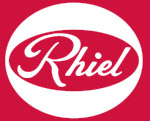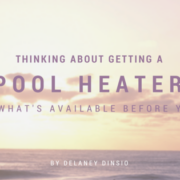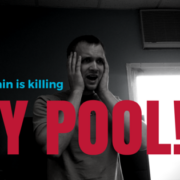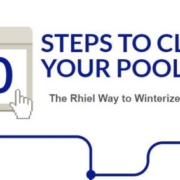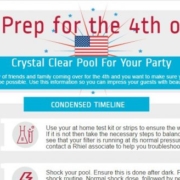Thinking About Getting a Pool Heater?
Heaters are a great addition to your pool. No one enjoys swimming in chilly water and a heater can fix that for you. There are many types of heaters, such as natural gas, propane, electric, and solar heaters. So we compiled a list of information on each heater to help you decide what heater would be best for your pool.
Solar Heater – A solar heater is an inexpensive way to heat your pool. Besides purchasing the solar dome, there is no other cost associated with a solar heater. The draw back with solar heaters is that if you don’t have any sun, then your water will not be getting any heat. You also need to look at the size of your pool. If you have a 24 ft round pool, then you will need more than 1 solar heater for your pool. Depending on the amount of sun available that day, your pool might not be getting noticeably warmer.
Gas Heater – Gas heaters are the most common heaters customers chose to heat their pool. Gas heaters have a copper heat exchange, so maintaining your water chemistry is very important. If your water becomes unbalanced or too acidic, it will begin to eat away at your copper heat exchange very quickly. If you are not constantly monitoring your water chemistry with a gas heater and your copper heat exchange is ruined then you will need to have it repaired and it can be a very expensive thing to fix. Most customers who have their copper heat exchange eaten away end up having to purchase a new heater, because the repair cost is so high. Gas heaters may also involve landscaping, if you run gas lines straight to your pool.
Propane Heater – With propane heaters you will have to purchase or lease propane tanks. Propane heaters are what you will want to use if you can’t get a natural gas line run out to your pool. Propane heaters also have a copper heat exchange so they have the same risk as gas heaters if your water is not kept balanced. All-in-all propane heaters are very similar to gas heaters.
Electric Heater – Electric heaters, or heat pumps, have a titanium heat exchange. With titanium heat exchanges, great water chemistry is not as critical to your heat exchange life expectancy, but we still recommend you keep your water balanced. Unbalanced water can cause problems with your heater and your pool water itself. Electric heaters are more expensive to purchase, but they are less expensive to operate long term. Heat pumps do, however, require the ambient air temperature to be higher than 40 degrees Fahrenheit. This is because a heat pump draws warmth from the surrounding air to heat the water. Most people do not use their pools if it is less than 40 degrees, but if you do you may want to consider something else.
Pool heaters are a great way to extend your swimming season and get more use out of your pool. They also help make your pool more comfortable during the season. If you are in the market for a pool heater make sure you take your time and find the right solution for your unique needs. I hope this brief overview can give you good start in your search for the perfect heater for your pool. If you have any questions or need help in the process please give us a call or stop into one of retail stores.
[et_bloom_inline optin_id=optin_8]
